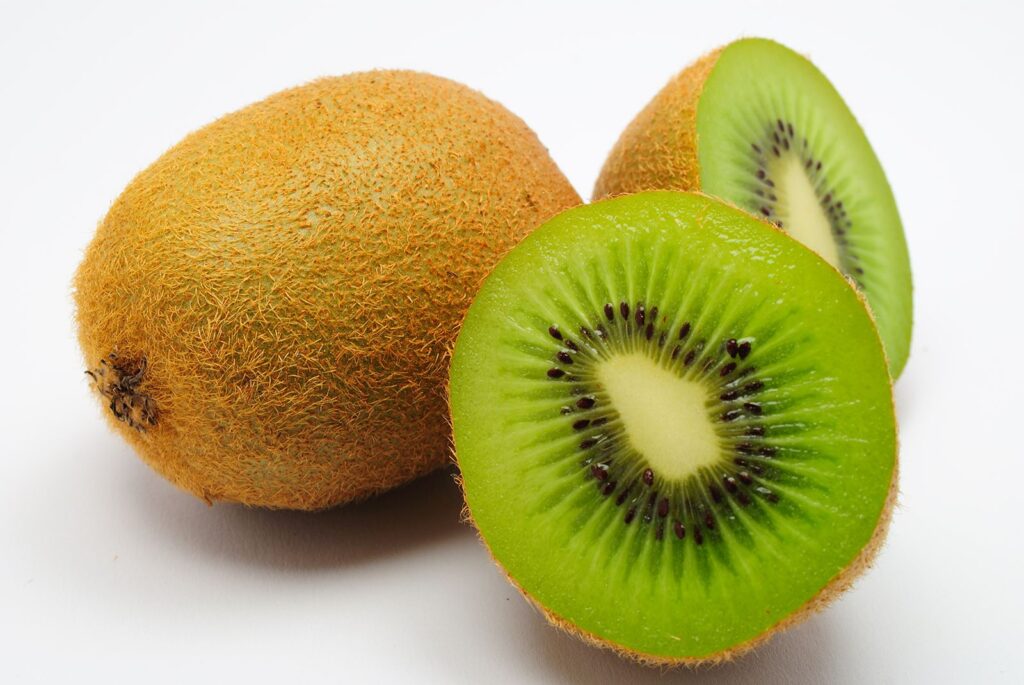Kiwi fruit is packed with nutrients and offers a range of health benefits. Here are 10 benefits of consuming kiwi:

1. Rich in Vitamin C: Kiwi is an excellent source of Vitamin C, which boosts the immune system and promotes healthy skin.
2. Supports Digestive Health: Kiwi contains an enzyme called actinidin that helps with the digestion of proteins and supports overall gut health.
3. High in Antioxidants: Kiwi is loaded with antioxidants like flavonoids and carotenoids, which help reduce oxidative stress and protect cells from damage.
4. Improves Heart Health: The high potassium content in kiwi helps manage blood pressure, while its antioxidants promote better cardiovascular health.
5. Aids in Weight Management: With low calories and high fiber content, kiwi can help you feel fuller for longer, making it easier to manage weight.
6. Promotes Skin Health: Vitamin C and other antioxidants in kiwi help reduce the signs of aging, promote collagen production, and improve skin texture.
7. Supports Eye Health: Kiwi is a good source of lutein and zeaxanthin, which help protect the eyes from harmful UV rays and reduce the risk of macular degeneration.
8. Boosts Immune Function: Kiwi’s high Vitamin C content strengthens the immune system and helps fight off infections.
9. Reduces Inflammation: The compounds in kiwi can help reduce inflammation in the body, potentially benefiting conditions like arthritis.
10. Improves Sleep Quality: Studies have shown that eating kiwi before bed may improve sleep quality, thanks to its antioxidant and serotonin content.
Including kiwi in your diet can offer a wide range of health benefits, making it a delicious and nutritious choice!
While kiwi offers many health benefits, there are also some potential drawbacks or side effects to consider. Here are 10 disadvantages of consuming kiwi:
1. Allergic Reactions: Some people may have an allergic reaction to kiwi, causing symptoms such as itching, swelling, or hives, especially in individuals who are allergic to latex.
2. Mouth Irritation: Kiwi contains oxalates and enzymes (like actinidin) that can irritate the mouth or cause a tingling or burning sensation, especially in sensitive individuals
.3. High in FODMAPs: Kiwi is considered a high FODMAP fruit, which can cause digestive discomfort, such as bloating or gas, in people with irritable bowel syndrome (IBS).
4. Risk of Kidney Stones: Due to its high oxalate content, consuming large quantities of kiwi may contribute to kidney stone formation, particularly in individuals who are prone to them.
5. Interference with Blood Thinners: Kiwi is high in Vitamin K, which could interfere with the effectiveness of blood-thinning medications like warfarin. It’s best to monitor your Vitamin K intake if you’re on such medications.
6. Potential for Digestive Issues: Eating too many kiwis, especially on an empty stomach, may cause stomach upset, diarrhea, or other gastrointestinal issues because of its fiber and enzyme content.
7. Pesticide Residues: Non-organic kiwis may contain pesticide residues. If not washed properly, these chemicals can affect your health.
8. Dental Sensitivity: The acidity of kiwi can erode tooth enamel over time if consumed in large amounts, leading to potential dental sensitivity or cavities.
9. May Cause Skin Sensitivity: The skin of kiwi can be tough to digest and might cause skin irritation for some individuals, especially when consumed with the skin on.
10. Possible Interactions with Certain Medications: Kiwi contains compounds that may interact with some medications, such as those used for blood pressure or blood sugar management. It’s advisable to consult a healthcare provider if you’re on any medication.
While kiwi is generally a healthy and beneficial fruit, it’s important to be aware of these potential disadvantages and consume it in moderation.